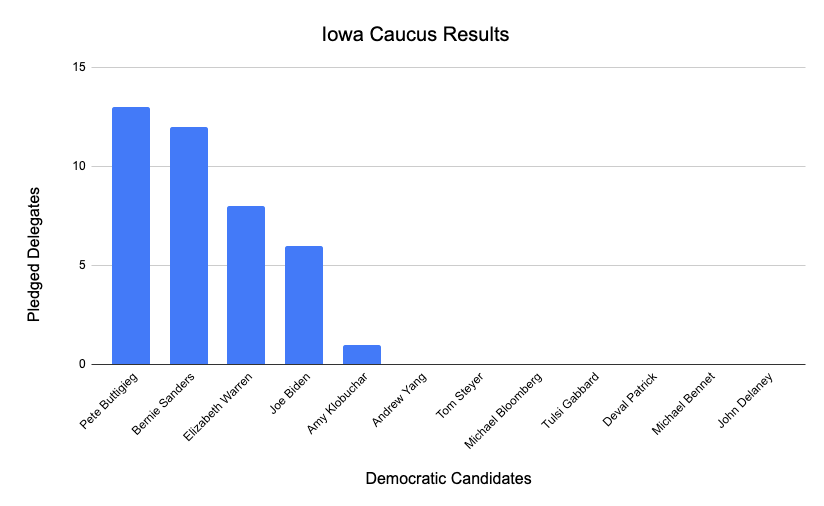Iowa caucuses: Its significance and recent controversy
February 10, 2020
The Associated Press said it was unable to declare a winner in the Iowa caucuses after results were delayed.
According to the most recent results reported by The New York Times, Pete Buttigieg has 13 pledged delegates while Sen. Bernie Sanders is right behind with 12. All precincts have been reported.
A smartphone app produced by a for-profit tech company called Shadow Inc. is at the center of the delayed results as it did not work for all users. The New York Times reported that the Iowa Democratic Party commissioned the company to create an app that would help report results from around the state.
Iowa is the first test in the United States presidential primary cycle. Unlike primaries, participants in caucuses do not cast a vote but instead gather at set locations in their precincts for the candidate they are supporting. Nathan Blasio, a teaching assistant in the political science department, pointed to the deliberation aspect.
“Some caucus goers come to the caucuses with an idea of who they are going to support when they’re at the venue, but many don’t and they just want to be a part of the political process,” Blasio said. “It’s up to the hardliners of each candidate to make a compelling case to those undecided and people committed to other candidates.”
Supporters are counted as a candidate when they meet a 15% threshold of attendees to be considered viable. If a participant’s chosen candidate fails to meet the threshold, they will realign and choose another candidate that is viable.
Ultimately, a candidate is trying to secure the most delegates.
“I think the most important thing to remember is when electorates show up, they’re not giving votes to candidates; they’re giving votes to delegates to give to candidates,” Blasio said.
Blasio agreed with the claim that the caucuses in Iowa are a strong indicator on how well a candidate’s campaign will do, with its ability to either give a candidate momentum or completely take it away. He also noted some of the disadvantages that come with the system.
“There are elements of ableism, such as people who have disabilities and might not be able to participate in the caucuses,” Blasio said. “People who come from poor socio-economic backgrounds might not have the time.”
However, Blasio did point out its strengths too.
“I think one of the strongest merits of the caucus system is that it directly aligns with one of America’s core ideologies and that is believing in a free marketplace of ideas.”
Blasio said it was surprising that former Vice President Joe Biden performed poorly in Iowa, as it was expected that he would do well with voters in rural areas. Meanwhile, Bryce Schlenker, Vice President of Kent State for Bernie 2020, was surprised with Andrew Yang’s performance.
“I thought Andrew Yang would do better,” Schlenker said. “I would say Andrew Yang had the best media presence, as he usually does.”
Schlenker felt that the Iowa caucuses were not a concrete victory for Buttigieg or Sanders. Instead, it was a big blunder for the Democratic National Committee due to the delayed results.
“I think if you’re going to do these antiquated election practices then you should keep it in an antiquated manner and not bring in modern technology into an old system,” Schlenker said.
Students for a Democratic Society President Colt Hutchinson specifically held the DNC accountable.
“The DNC will go to extreme lengths to avoid a people’s agenda,” Hutchinson said. “We encourage everyone to engage in grassroots organizing to effect real change in their communities.”
The Iowa caucuses still remain in doubt with talks of partial recanvasing. Despite the uncertainty, candidates are pressed on time and now have their eyes set on the New Hampshire primary tomorrow.
“There’s going to be a lot of people wondering what went wrong and how,” Blasio said. “I think the first step is going to be looking into the app.”
Chris Ramos covers politics. Contact him at [email protected].












